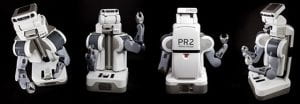The Results Are In : PR2 Beta Program Recipients!
(Willow Garage Announcement)
Motivation
There is a growing need in society to enable older adults to remain in an independent living environment. Many older adults fear losing their independence and being required to move to an assisted living facility. From a societal perspective, it is cost-effective to support older adults’ preference to age in place. The economic implications of transitioning to full-time residential care settings are substantial, both to individuals and to society. Given current demographics, these costs are projected to increase exponentially. Older adults living in their own homes may be faced with situations in which there is a mismatch between the demands of their daily environment and their capabilities. These situations generally result from both increased demands (e.g., use of new medical devices) and deficits in the capabilities of the individual (e.g., age-related changes in cognition, perception, or movement control). There is great potential for robotics to support the needs of older adults — either directly or by supporting the activities of professional caregivers (e.g., nurses or physical therapists) who work in the homes of older adults.
Approach
The proposed research will consist of two closely integrated thrusts: one devoted to human-robot interaction and the other focused on software development. Both thrusts will be directed toward the development of assistive capabilities for the PR2 robot, with an emphasis on home care for older adults. These two thrusts are highly synergistic. The human-robot interaction (HRI) thrust will help ensure that the software development is closely connected to real-world needs, and the software development thrust will provide capabilities that both inform and enable cutting-edge studies of human-robot interaction.
An Interdisciplinary Team
Prof. Charlie Kemp, a leading researcher in the area of assistive mobile manipulation, will serve as the PI for the overall project and thrust leader for software development. Prof. Wendy Rogers, who is a leading researcher on technology and human factors for older adults, will be the thrust leader for human-robot interaction. They will lead a cross-disciplinary team of 17 researchers. Each of the four Co-PIs brings important expertise to the project. Prof. James M. Rehg is a leading expert in computer vision and machine learning, and is the Associate Director of Research in the Center for Robotics and Intelligent Machines. Prof. Andrea Thomaz is a pioneer in HRI and socially guided machine learning. Dr. Tracy Mitzner has almost a decade of experience conducting research on human factors and aging, with the goal of finding ways that technology can support aging. Brian Jones, the Director of the Aware Home Research Initiative, will provide supported access to the Aware Home, a free-standing home on the Georgia Tech campus that will house the PR2 for two 3-month periods so that we may conduct HRI studies and software evaluations in a realistic home environment.


